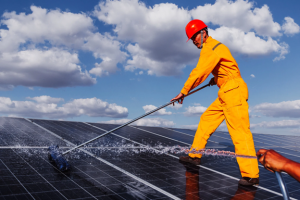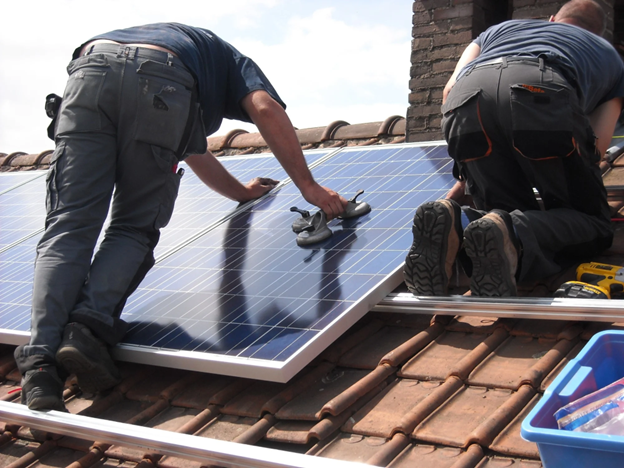As the world grapples with climate change and the pressing need for sustainable energy sources, solar power has emerged as a front-runner in the renewable energy revolution. More homeowners, businesses, and governments are considering solar panels as a viable option to reduce their carbon footprint and harness the power of the sun. But the big question remains: Is investing in solar panels worth it? In this blog post, we’ll delve into the environmental and economic benefits, explore key considerations before making an investment, and look at the future outlook for solar energy.
The Environmental and Economic Benefits of Solar Panels
Environmental Impact
One of the most compelling reasons to invest in solar panels is their positive impact on the environment. Traditional energy sources like coal and natural gas contribute significantly to greenhouse gas emissions, leading to global warming and environmental degradation. Solar energy, on the other hand, is a clean and renewable resource that generates electricity without emitting harmful pollutants.
By installing solar panels, you can:
- Reduce Carbon Footprint: Solar panels produce electricity without burning fossil fuels, which means no CO₂ emissions.
- Conserve Water: Unlike coal and nuclear power plants, solar energy systems do not require water for cooling.
- Decrease Air Pollution: Solar panels help reduce the release of harmful pollutants such as sulfur dioxide and nitrogen oxides, improving air quality.
Economic Benefits
Beyond environmental advantages, solar panels offer several economic benefits that make them an attractive investment:
- Lower Electricity Bills: Solar panels generate electricity that can be used to power your home, significantly reducing your monthly electricity bills. Depending on the size of the system and local electricity rates, some homeowners can eliminate their bills entirely.
- Increase Property Value: Homes equipped with solar energy systems often see a rise in property value. Potential buyers are willing to pay a premium for a home with lower utility costs and a reduced environmental impact.
- Earn Incentives and Rebates: Various federal, state, and local incentives can offset the initial cost of installing solar panels. These incentives include tax credits, rebates, and performance-based incentives that pay you for the energy your system generates.
- Net Metering: Many utility companies offer net metering programs, allowing you to sell excess electricity generated by your solar panels back to the grid. This can further reduce your energy costs and provide an additional income stream.
Moreover, you can find professionals who can answer any potential question you may have. From understanding solar panels and how they work, to choosing the right system for your needs, they can guide you through the entire process. That way, you can make an informed decision and reap the maximum benefits from your investment.
Considerations Before Investing
While the benefits are clear, there are several factors to consider before making the investment in solar panels.
Initial Cost
The upfront cost of solar panel installation can be significant, ranging from $15,000 to $25,000 for an average residential system. However, this cost has been decreasing over the years and can be mitigated through various financing options, incentives, and rebates. It’s essential to calculate the return on investment (ROI), taking into account potential savings on electricity bills and any financial incentives available.
Available Incentives
Government incentives play a critical role in making solar panel investments more affordable. The Federal Solar Investment Tax Credit (ITC) offers a substantial tax break for solar installations. Many states and municipalities also offer additional incentives, rebates, and grants. Be sure to research and take advantage of these programs to reduce your overall investment cost.
Maintenance and Lifespan
Solar panels require minimal maintenance, primarily involving periodic cleaning and annual inspections. Most solar panels come with a 25-30-year warranty, and their efficiency typically degrades by about 0.5% per year. Inverters, which convert the generated DC electricity to AC electricity, may need replacement after 10-15 years. Overall, maintenance costs are relatively low compared to the savings on electricity bills.
Impact on the Environment and Local Grid
While solar panels are environmentally friendly, their manufacture does involve some environmental impact. The production process uses energy and materials, contributing to a small carbon footprint. However, this is quickly offset by the clean energy they produce over their lifetime.
Additionally, large-scale adoption of solar power can affect local power grids. Solar energy is intermittent, depending on sunlight availability, which can cause fluctuations in power supply. Energy storage solutions, such as batteries, and grid modernization efforts are essential to address these challenges.

Investing in solar panels is a decision that offers substantial environmental and economic benefits. While the initial cost can be high, various incentives and the long-term savings on electricity bills make it a worthwhile investment. Additionally, the positive impact on property value and the opportunity to earn through net metering further sweeten the deal.
However, it’s crucial to consider factors like the initial cost, available incentives, maintenance requirements, and the impact on the environment and local grid before making a commitment. With the rapid advancements in solar technology and the growing emphasis on sustainable energy, solar panels are poised to become an even more attractive investment in the years to come.

Recent Comments